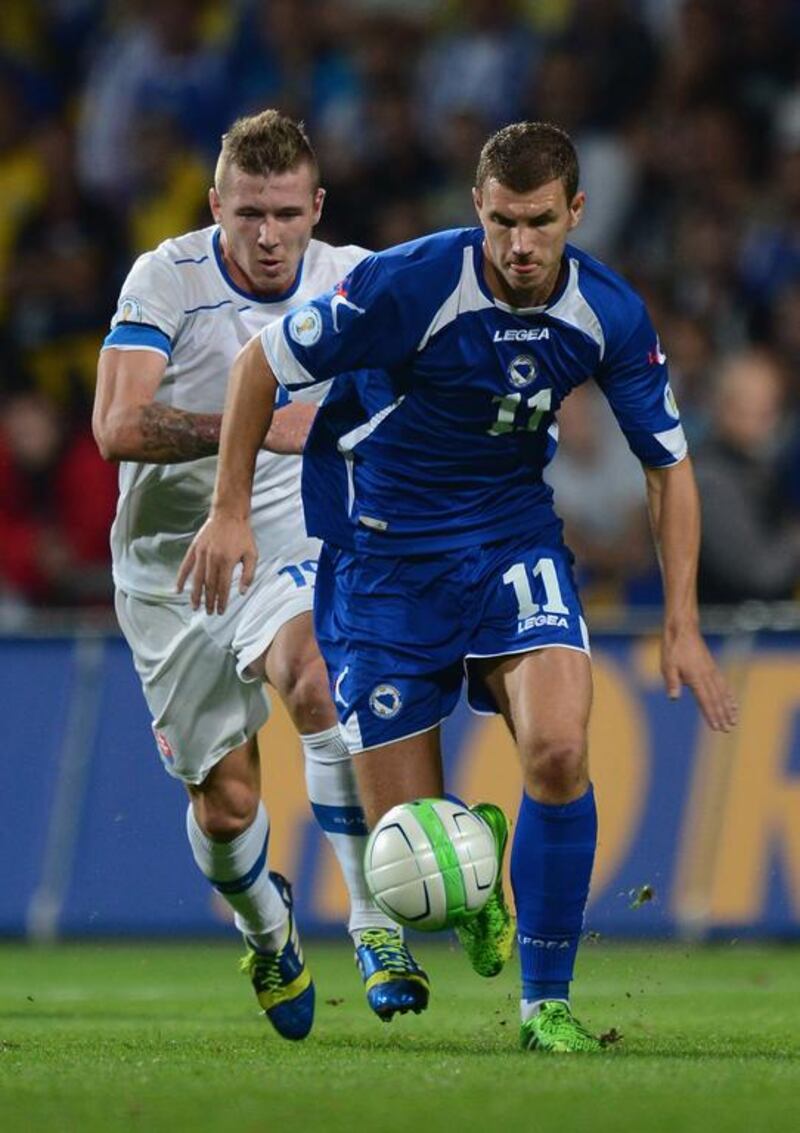Last month, the Roma midfielder Miralem Pjanic walked into a pharmacy in Sarajevo and bought every drug they had to donate to the campaign to help the victims of the flooding that has devastated Bosnia and Herzegovina, as well as parts of Croatia and Serbia.
At least 20 people died and thousands were left homeless as heavy rainfall brought landslides. A further complication to the relief effort is unexploded mines left from the war of the 1990s. Previously, people at least knew where the mines were. Now, after fields have been washed away, mines could be anywhere.
As the World Cup squad gathered to prepare for Bosnia’s first appearance at a World Cup, football, not for the first time in the country, has been pushed to the back of players’ minds.
“I think it’s important for the people, for the world, to know this is not a game,” Manchester City striker Edin Dzeko said. “This is something serious. So many people have lost their lives, lost their homes. They were trying to build something for themselves and for their kids over the past 20 years and they’ve lost it, just like that.”
Bosnia’s players already knew that their responsibilities in Brazil are about more than football; the floods have merely underlined that.
They are the only qualifiers not to have played at the tournament before, and their story is an extraordinary one.
In a troubled nation, the football team is just about the only thing that brings together the three main ethnic groups.
To go to home games in the tight, dilapidated stadium in Zenica, an industrial town an hour or so north-west of Sarajevo, is to see a vision of what Bosnia could be.
There Serbs carrying flags bearing the name of their capital, Banja Luka, mix happily with Muslim women wearing headscarves fashioned from the national flag. Ethnic divisions melt away: Bosnian players are Bosnian players.
But the team represents more than that. Bosnia’s recent past led many to flee and that creates complications of nationality. Yet this is the team of the diaspora.
Pjanic grew up in Luxembourg and played football for them at youth level; the goalkeeper Asmir Begovic was raised in Canada, the attacking midfielder Zvjezdan Misimovic was born in Germany, the forward Vedad Ibisevic played college soccer for Saint Louis University in the United States. The holding midfielder, Haris Medanjunin, fled to the Netherlands with his mother; his father stayed behind and was killed.
They all have come home.
Dzeko stands at the heart of the side, not only because he is the highest-profile player, but because he never left. He was six when the war began, and soon after Sarajevo had been ringed by Serbian troops, his parents’ flat was destroyed by a mortar attack.
He spent the war living with his whole family at his grandparents’ apartment: a dozen people in a flat measuring 35 square metres.
During the siege, football provided a release. Hajro Bojadzic was a coach who took teams to compete in futsal tournaments.
“Dzeko was one of a small group of kids I’d take to play in tournaments held in school gyms during the war,” he said. “We’d walk for many kilometres, going from houses to other places under cover to avoid the snipers. It was a very hard and dangerous time, but even though the boys were always hungry, they used to play with a huge smile on their faces.”
“Every time Edin went out, I felt afraid,” said Dzeko’s mother, Belma. “I know it was crazy, but I couldn’t forbid him to play. He was just a kid. There was one time when he begged to go out, but I had a strange feeling and said no. A few minutes later, a bomb hit the playground. A lot of kids died that day.”
Stories are told of dozens of people clustering around televisions to watch games from USA ’94.
And now Bosnia are at the World Cup themselves, and for those affected by the flood, football is again offering some kind of escape.
sports@thenational.ae
Follow our sports coverage on twitter at @SprtNationalUAE





